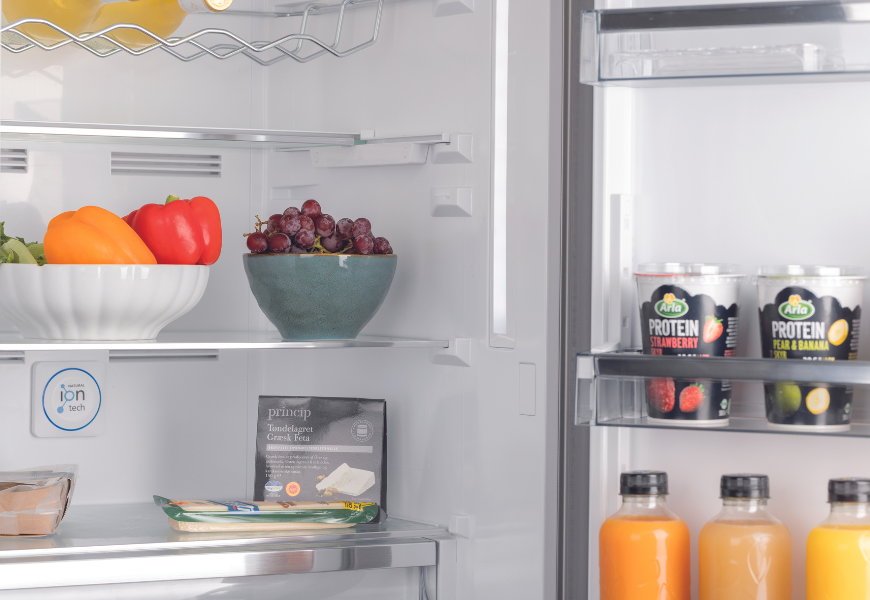Guide: How to store your food correctly in a fridge freezer
Proper storage of food in a fridge freezer is not only good for hygiene and the durability of the food but also makes sense because you avoid throwing away food that has been stored incorrectly and can no longer be eaten. Read our guide.

We have gathered a wide range of tips on how to manage the storage of your food in your Vestfrost fridge freezer. You will learn where to store the different food groups and what not to store together.
To make it more manageable, we have divided the guide into the fridge and freezer sections of the fridge freezer.
Proper storage in the fridge compartment
The fridge compartment is intended for short-term storage of food and beverages.
Proper storage of food:
- Bottles can be stored on the designated door shelf.
- Fresh foods that are well-packaged can be stored on the shelves of the cabinet.
- Fresh fruits/vegetables should be stored in the vegetable drawer.
- Dairy products and eggs can be placed in the designated compartments in the door.
- Cooked food should be stored in airtight containers with lids.
- Fresh meat should be wrapped in plastic bags and placed on the bottom shelf. Do not let fresh, unpackaged meat come into contact with cooked food. Fresh ground meat should be cooked on the same day it is purchased.
- Other fresh meat products should be kept in the refrigerator for a maximum of 2-3 days.
Tips for proper storage:
- Allow hot food and beverages to cool before placing them in the cabinet.
- Do not place hot food in the fridge. Wait until the food is at room temperature. Hot food will raise the temperature in the fridge, which can cause food poisoning and spoil the food.
- Under normal operating conditions, it is sufficient to set the refrigerator temperature to +4 °C.
- The fridge temperature should be between 0-8°C. Fresh foods stored at a temperature below 0°C can freeze and rot. The amount of bacteria increases at temperatures above 8°C, which can spoil the food.
- Meat products, fruits, and vegetables should not be stored together as they can contaminate each other (also known as cross-contamination).
- Food should be stored in closed containers or covered in the refrigerator to prevent moisture and odour.
- Never store explosive and flammable liquids in the refrigerator (such as acetone, gasoline, and the like). Alcohol with a high percentage should be stored upright in sealed bottles.
NOTE: Potatoes, onions, and garlic should not be stored in the refrigerator.
Proper storage in the freezer compartment
The freezer compartment in the cabinet is rated 4-star and intended for long-term storage of frozen food and ice making.
Proper storage of food in the freezer compartment:
- Place frozen products in the freezer as quickly as possible after purchase and store the items in a cooler bag during transport from the point of purchase.
- Make sure the contents are labelled with the type and date.
- Do not exceed the last sale date or "Best before" date. If there is no time indication on the packaging, the product should be kept in the freezer for a maximum of 3 months.
- Do not place fresh food next to already frozen items as they can thaw.
- Do not freeze too large quantities at a time. The food will be best when frozen completely in as short a time as possible.
- The normal storage temperature in the freezer should be -18°C. This can be checked with a freezer thermometer to ensure that the cabinet has the correct temperature. The thermometer reading should be done very quickly, as the temperature rises immediately when the thermometer is taken out of the cabinet.
- Sparkling drinks should not be frozen, and ice should not be eaten directly from the freezer (risk of frostbite).
Tips in case of power failure
- In case of a power failure, avoid opening the freezer door. After a prolonged power failure, check the quality of the food and either eat it immediately or cook it and freeze it again. If hot food is placed in the freezer, the compressor will run continuously until the food is frozen. This can temporarily make the fridge very cold.
Best practice - and change in taste when frozen
- Frozen foods that have been thawed should be cooked like fresh foods. If they are not cooked after being thawed, they should never be frozen again.
- The taste of certain spices in ready meals (anise, basil, watercress, vinegar, assorted spices, ginger, garlic, onion, mustard, thyme, marjoram, pepper, etc.) changes and they take on a strong flavour when frozen for a long time. Therefore, only a small amount of spices should be added if you plan to freeze the food. Otherwise, the desired spices can be added after the food has been thawed.
- The storage time for the food depends on the oil used. Suitable oils are margarine, veal fat, olive oil and butter, while unsuitable oils are peanut oil and pork fat.
